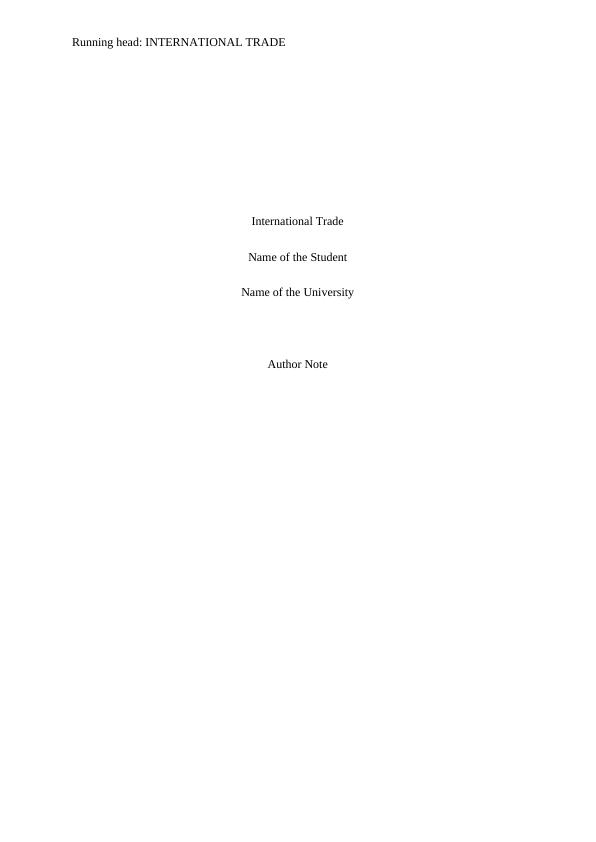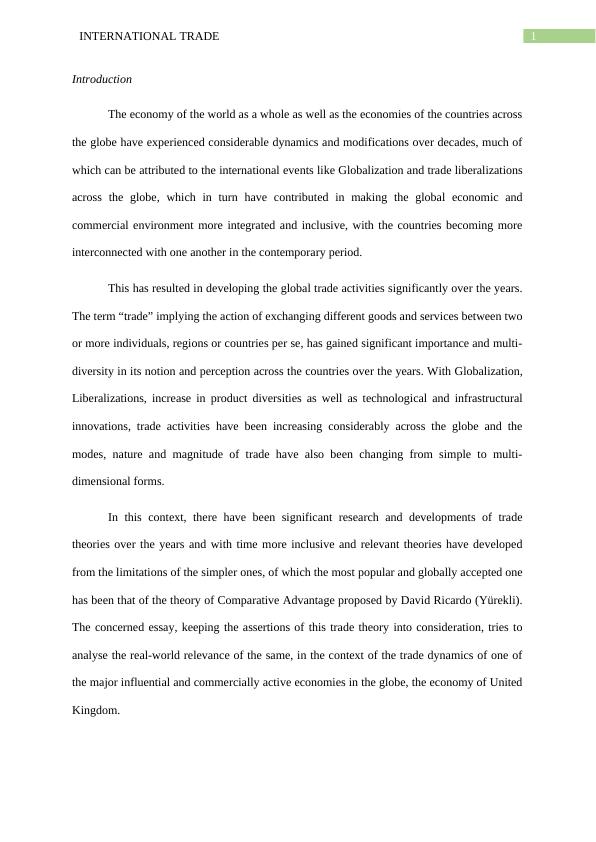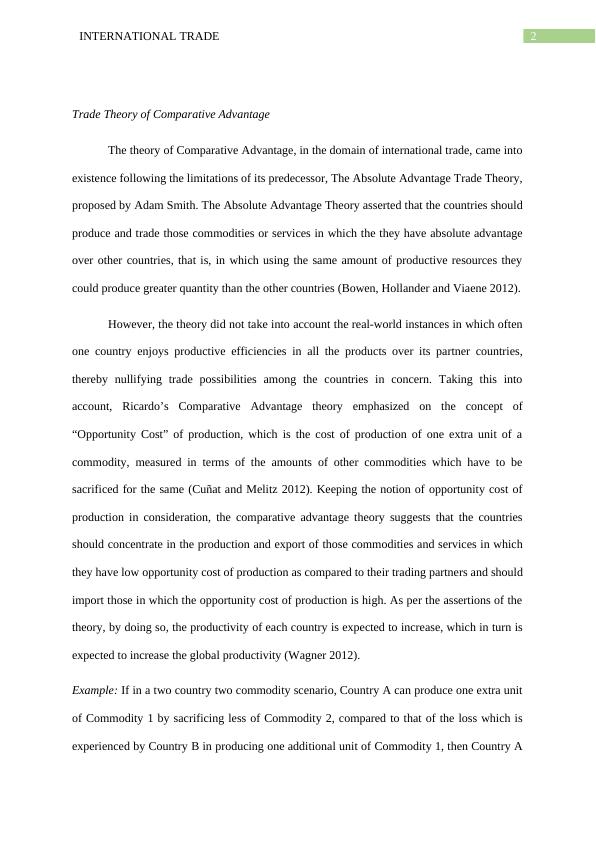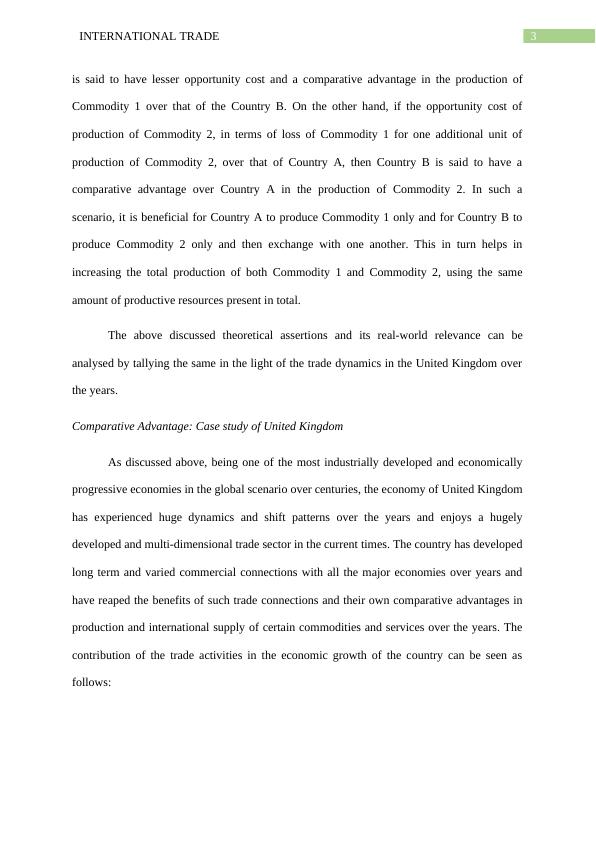International Trade: Theory of Comparative Advantage and Case Study of United Kingdom
Added on 2023-06-14
12 Pages2291 Words132 Views
Running head: INTERNATIONAL TRADE
International Trade
Name of the Student
Name of the University
Author Note
International Trade
Name of the Student
Name of the University
Author Note

1INTERNATIONAL TRADE
Introduction
The economy of the world as a whole as well as the economies of the countries across
the globe have experienced considerable dynamics and modifications over decades, much of
which can be attributed to the international events like Globalization and trade liberalizations
across the globe, which in turn have contributed in making the global economic and
commercial environment more integrated and inclusive, with the countries becoming more
interconnected with one another in the contemporary period.
This has resulted in developing the global trade activities significantly over the years.
The term “trade” implying the action of exchanging different goods and services between two
or more individuals, regions or countries per se, has gained significant importance and multi-
diversity in its notion and perception across the countries over the years. With Globalization,
Liberalizations, increase in product diversities as well as technological and infrastructural
innovations, trade activities have been increasing considerably across the globe and the
modes, nature and magnitude of trade have also been changing from simple to multi-
dimensional forms.
In this context, there have been significant research and developments of trade
theories over the years and with time more inclusive and relevant theories have developed
from the limitations of the simpler ones, of which the most popular and globally accepted one
has been that of the theory of Comparative Advantage proposed by David Ricardo (Yürekli).
The concerned essay, keeping the assertions of this trade theory into consideration, tries to
analyse the real-world relevance of the same, in the context of the trade dynamics of one of
the major influential and commercially active economies in the globe, the economy of United
Kingdom.
Introduction
The economy of the world as a whole as well as the economies of the countries across
the globe have experienced considerable dynamics and modifications over decades, much of
which can be attributed to the international events like Globalization and trade liberalizations
across the globe, which in turn have contributed in making the global economic and
commercial environment more integrated and inclusive, with the countries becoming more
interconnected with one another in the contemporary period.
This has resulted in developing the global trade activities significantly over the years.
The term “trade” implying the action of exchanging different goods and services between two
or more individuals, regions or countries per se, has gained significant importance and multi-
diversity in its notion and perception across the countries over the years. With Globalization,
Liberalizations, increase in product diversities as well as technological and infrastructural
innovations, trade activities have been increasing considerably across the globe and the
modes, nature and magnitude of trade have also been changing from simple to multi-
dimensional forms.
In this context, there have been significant research and developments of trade
theories over the years and with time more inclusive and relevant theories have developed
from the limitations of the simpler ones, of which the most popular and globally accepted one
has been that of the theory of Comparative Advantage proposed by David Ricardo (Yürekli).
The concerned essay, keeping the assertions of this trade theory into consideration, tries to
analyse the real-world relevance of the same, in the context of the trade dynamics of one of
the major influential and commercially active economies in the globe, the economy of United
Kingdom.

2INTERNATIONAL TRADE
Trade Theory of Comparative Advantage
The theory of Comparative Advantage, in the domain of international trade, came into
existence following the limitations of its predecessor, The Absolute Advantage Trade Theory,
proposed by Adam Smith. The Absolute Advantage Theory asserted that the countries should
produce and trade those commodities or services in which the they have absolute advantage
over other countries, that is, in which using the same amount of productive resources they
could produce greater quantity than the other countries (Bowen, Hollander and Viaene 2012).
However, the theory did not take into account the real-world instances in which often
one country enjoys productive efficiencies in all the products over its partner countries,
thereby nullifying trade possibilities among the countries in concern. Taking this into
account, Ricardo’s Comparative Advantage theory emphasized on the concept of
“Opportunity Cost” of production, which is the cost of production of one extra unit of a
commodity, measured in terms of the amounts of other commodities which have to be
sacrificed for the same (Cuñat and Melitz 2012). Keeping the notion of opportunity cost of
production in consideration, the comparative advantage theory suggests that the countries
should concentrate in the production and export of those commodities and services in which
they have low opportunity cost of production as compared to their trading partners and should
import those in which the opportunity cost of production is high. As per the assertions of the
theory, by doing so, the productivity of each country is expected to increase, which in turn is
expected to increase the global productivity (Wagner 2012).
Example: If in a two country two commodity scenario, Country A can produce one extra unit
of Commodity 1 by sacrificing less of Commodity 2, compared to that of the loss which is
experienced by Country B in producing one additional unit of Commodity 1, then Country A
Trade Theory of Comparative Advantage
The theory of Comparative Advantage, in the domain of international trade, came into
existence following the limitations of its predecessor, The Absolute Advantage Trade Theory,
proposed by Adam Smith. The Absolute Advantage Theory asserted that the countries should
produce and trade those commodities or services in which the they have absolute advantage
over other countries, that is, in which using the same amount of productive resources they
could produce greater quantity than the other countries (Bowen, Hollander and Viaene 2012).
However, the theory did not take into account the real-world instances in which often
one country enjoys productive efficiencies in all the products over its partner countries,
thereby nullifying trade possibilities among the countries in concern. Taking this into
account, Ricardo’s Comparative Advantage theory emphasized on the concept of
“Opportunity Cost” of production, which is the cost of production of one extra unit of a
commodity, measured in terms of the amounts of other commodities which have to be
sacrificed for the same (Cuñat and Melitz 2012). Keeping the notion of opportunity cost of
production in consideration, the comparative advantage theory suggests that the countries
should concentrate in the production and export of those commodities and services in which
they have low opportunity cost of production as compared to their trading partners and should
import those in which the opportunity cost of production is high. As per the assertions of the
theory, by doing so, the productivity of each country is expected to increase, which in turn is
expected to increase the global productivity (Wagner 2012).
Example: If in a two country two commodity scenario, Country A can produce one extra unit
of Commodity 1 by sacrificing less of Commodity 2, compared to that of the loss which is
experienced by Country B in producing one additional unit of Commodity 1, then Country A

3INTERNATIONAL TRADE
is said to have lesser opportunity cost and a comparative advantage in the production of
Commodity 1 over that of the Country B. On the other hand, if the opportunity cost of
production of Commodity 2, in terms of loss of Commodity 1 for one additional unit of
production of Commodity 2, over that of Country A, then Country B is said to have a
comparative advantage over Country A in the production of Commodity 2. In such a
scenario, it is beneficial for Country A to produce Commodity 1 only and for Country B to
produce Commodity 2 only and then exchange with one another. This in turn helps in
increasing the total production of both Commodity 1 and Commodity 2, using the same
amount of productive resources present in total.
The above discussed theoretical assertions and its real-world relevance can be
analysed by tallying the same in the light of the trade dynamics in the United Kingdom over
the years.
Comparative Advantage: Case study of United Kingdom
As discussed above, being one of the most industrially developed and economically
progressive economies in the global scenario over centuries, the economy of United Kingdom
has experienced huge dynamics and shift patterns over the years and enjoys a hugely
developed and multi-dimensional trade sector in the current times. The country has developed
long term and varied commercial connections with all the major economies over years and
have reaped the benefits of such trade connections and their own comparative advantages in
production and international supply of certain commodities and services over the years. The
contribution of the trade activities in the economic growth of the country can be seen as
follows:
is said to have lesser opportunity cost and a comparative advantage in the production of
Commodity 1 over that of the Country B. On the other hand, if the opportunity cost of
production of Commodity 2, in terms of loss of Commodity 1 for one additional unit of
production of Commodity 2, over that of Country A, then Country B is said to have a
comparative advantage over Country A in the production of Commodity 2. In such a
scenario, it is beneficial for Country A to produce Commodity 1 only and for Country B to
produce Commodity 2 only and then exchange with one another. This in turn helps in
increasing the total production of both Commodity 1 and Commodity 2, using the same
amount of productive resources present in total.
The above discussed theoretical assertions and its real-world relevance can be
analysed by tallying the same in the light of the trade dynamics in the United Kingdom over
the years.
Comparative Advantage: Case study of United Kingdom
As discussed above, being one of the most industrially developed and economically
progressive economies in the global scenario over centuries, the economy of United Kingdom
has experienced huge dynamics and shift patterns over the years and enjoys a hugely
developed and multi-dimensional trade sector in the current times. The country has developed
long term and varied commercial connections with all the major economies over years and
have reaped the benefits of such trade connections and their own comparative advantages in
production and international supply of certain commodities and services over the years. The
contribution of the trade activities in the economic growth of the country can be seen as
follows:

End of preview
Want to access all the pages? Upload your documents or become a member.
Related Documents
Analyzing Trade Dynamics of United Kingdom under Comparative Advantage Theorylg...
|13
|2269
|461
(PDF) Fundamental of Economicslg...
|13
|3045
|348
Fundamentals of economics - assignmentlg...
|12
|2796
|25
Fundamental of Economics - Essaylg...
|13
|3219
|49
Fundamentals of Economics PDFlg...
|11
|2464
|33
Comparative Advantage and International Tradelg...
|7
|1104
|57
